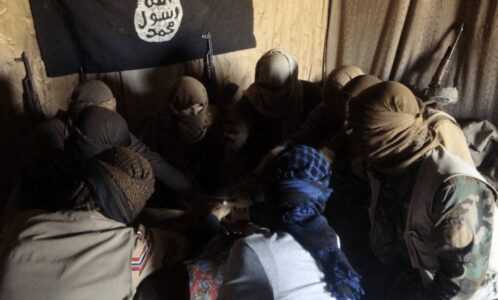
Islamic State exploiting coronavirus security gaps to relaunch insurgency
There has been a significant rise in ISIS attacks in Iraq and Syria, with the group exploiting security gaps in Iraq caused by the coronavirus pandemic to relaunch and invigorate its rural insurgency in the country, according to a report submitted to the UN Security Council that was made public on Thursday.
The wide-ranging report, put together by the UN monitoring team that tracks the global jihadi terror threat, states that the group is consolidating in Iraq and Syria and “showing confidence in its ability to increasingly operate in a brazen manner in its former core area.”
It states that the number of ISIS attacks in Iraq and Syria “increased significantly in early 2020 as compared with the same period in 2019.”
Referring to the situation in Iraq, the UN monitoring team stated that ISIS has “exploited security gaps caused by the pandemic and by political turbulence in Iraq to relaunch a sustained rural insurgency, as well as sporadic operations in Baghdad and other large cities.”
In recent weeks in particular, Iraq has seen a huge surge in Covid-19 cases, with the number of cumulative cases surpassing 100,000 on Thursday compared with fewer than 7,000 confirmed on June 1.
Syria has far fewer confirmed cases, but leaders of the US-backed Syrian Democratic Forces say ISIS has exploited the fact that the pandemic has limited the SDF’s mobility in the region.
Gen. Mazloum Abdi, the top commander of the SDF, told CTC Sentinel, the monthly publication of the Combating Terrorism Center at West Point, in June that a major Covid-19 outbreak would limit his forces’ ability to counter the Islamic State “because we will be busy managing the situation in detention facilities” where the group currently houses thousands of former ISIS members.
The newly released UN report, which is based on information from member states, estimates that there are currently more than 10,000 ISIS fighters in Iraq and Syria.
One reason for ISIS’s resilience in those countries is money. According to the new UN report, member states assess ISIS still has approximately $100 million in reserves. It states the group’s assets are “believed to take the form of cash, buried or stored in caches across the conflict zone or kept with financial facilitators in neighbouring countries.
Some of the funds have been invested in legitimate businesses in Iraq, the Syrian Arab Republic and neighbouring countries.”
Source: CNN





